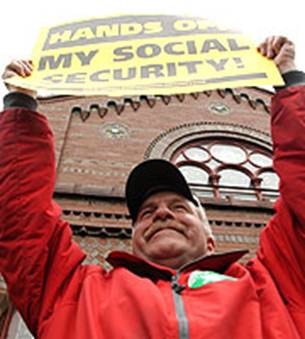|
|
Protesters of Overhaul Dog Bush
By Richard Benedetto, Usa Today
May 24, 2005

Pat Doyle protests President Bush's social security plan in Rochester, N.Y.
Karin von Voigtlander, Democrat and Chronicle
Gone are the days when a president could travel to a community to make a pitch for a favorite program and bask in mostly favorable local media coverage.
Armed with a variety of publicity techniques honed in recent election campaigns, opponents are vying effectively with the
president for local media attention before, during and after presidential visits.
And they are doing that at nearly every stop on President Bush's Social Security tour, which began in February and landed Tuesday in this suburb near Rochester in western New York.
Tuesday's stop was Bush's 33rd in 26 states since Feb. 2. Cara Morris, of Americans United to Protect Social Security, an umbrella group opposed to the president's plan to divert some Social Security payroll taxes to individual investment accounts, says her Washington-based coalition has worked with local members in each state to stage a "push-back" rally or news conference at all but one stop.
Grass-roots effort
"As soon as we find out where the president is going, we reach out to our local grass-roots groups and start organizing," she says.
Stephen Hess, a presidential scholar at the Brookings Institution, a think tank, says this kind of opposition campaigning is a relatively new strategy employed in part because Bush himself has used the techniques of an election campaign to push his Social Security proposal. "They know he's going out to promote his plan, and the opposition goes out and tries to match him," Hess says.
A large part of that is aggressive outreach to the local media. Scott
McIntosh, assistant metro editor of the Rochester Democrat and Chronicle, said three separate groups worked to stage events and gain publicity. He said all of them contacted the newspaper, which is owned by Gannett, the company that owns USA TODAY. Even individual reporters got calls.
"They were pretty well organized," McIntosh said. They sent us press releases in advance and we covered all their events," he said.
Of course, opponents can't match Bush in sheer volume of local media coverage. Presidential visits are rare in most communities, and they're often covered like a combination of a rock concert, a Hollywood premiere and the Super Bowl.
Local newspapers and radio and TV stations here ran stories about the Bush visit and his Social Security proposals for several days before the Tuesday arrival. On Monday night, TV weather reports were geared to the presidential visit: "What kind of weather will greet President Bush tomorrow?" one teaser said. On Tuesday, the landing and departure of Air Force One got live coverage on four Rochester TV stations. So did the president's speech.
Bush sounded familiar themes in his address at the Greece Athena Middle and High School. "I think more and more people recognize there's a problem (with Social Security), and people are going to say, 'Go do something about it.' And those who obstruct reform - no matter what party they're in - will pay a political price, in my judgment," Bush said.
But even before he got to town, opponents got their licks in. On Sunday, activists gathered petitions from citizens at local cultural fairs for presentation to area Republican congressmen who have yet to take a stand on Bush's plan. That got newspaper and TV coverage.
On Monday, New York Assemblyman Herman Denny Farrell, the state Democratic Party chairman, blasted Bush's proposal: "The president's plan is nothing more than a recipe for fiscal disaster and will move the middle class into poverty." His words were picked up by radio, TV and newspapers Monday and Tuesday.
Grabbing attention
Farrell went to Rochester Monday to host a news conference of government and labor officials and citizen activists bent on airing their opposition to the Bush plan and gaining media attention for their views. Newspapers covered the event, and TV and radio reported on the news conference Monday evening and again Tuesday morning.
Newscasts after Bush had left Tuesday, featured the hoopla of the Bush visit, but they also contained reports on the downtown protest rally staged by opponents.
Analysts say the opposition's ability to counter the Bush message is contributing to the trouble Bush is having in winning support for his plan. "The longer he's out on the road, the less appreciation people have for (his plan)," says Larry Harris, of the non-partisan Mason-Dixon Poll.
|
|



